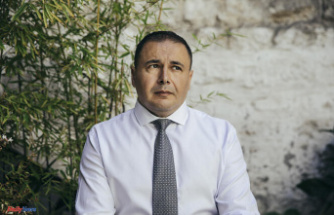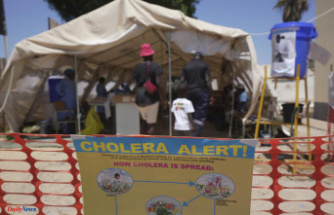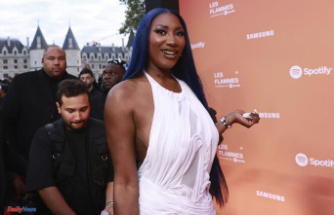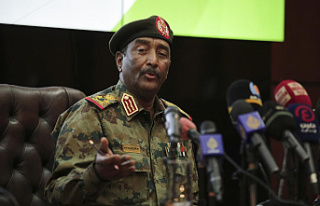Mevs is part of one of Haiti's most wealthy families. She owns Shodecosa which houses 93% of Haiti's import food. She has seen with dismay the country's descent into chaos following the assassination attempt on President Jovenel Moise.
One early morning in August, her office received the call. It came from Jimmy Cherizier, also known as Barbecue and a former cop who heads the G9 gang coalition that controls the Port-au-Prince coastal strip. He controls most of Haiti's gasoline and food, and can stop it with one word.
Barbecue's demand was $500,000 per month. This "war chest", he claimed, would be used to buy food and fight for democracy.
No problem, just pay the price. Refuse and Shodecosa will be ransacked. Gangs would also block roads around the port terminal, which is owned by the Mevs family.
_____
This story is part a series called "Haiti - Business, Politics and Gangs", produced with the support of the Pulitzer Center on Crisis Reporting.
____
The threat was real, Mevs knew. In June, three warehouses near by were looted. The math was simple: "How much can we afford?" It was not possible to afford it.
Do you think she should fight back? No. "We're not going to use a gun to defend a bag full of rice."
There was no one to help. There is no functioning government in Haiti. The country was ruled for decades by strong political leaders supported by armed groups; after Moise's death, the state crumbled and the gangs were no longer bound.
The government has taken the gangs out of the equation and they have turned into independent predators after losing their meal ticket. Some gangs resort to kidnapping like the 17 missionaries captured and their families. Barbecue's men seized control of the port district and seized complete control over the country's economy.
Mevs is not poor. Mevs is not poor, and she doesn't struggle for survival. In many ways, she is different from the Haitian migrants fleeing poverty. She, like others in her caste, traces her roots back to her ancestors who arrived from Europe and Middle East generations ago and made fortunes in Haiti.
She and other wealthy Haitians have no illusions about Haiti, just like the emigrants. While the country's future is secure, she wants her daughters to move abroad with their families. She may have to sell her possessions and move in with them if things don't improve.
She vows to fight for the country and the rebuilding of the government. She admits that gangs are part and parcel of Haiti's eco-system. This must be addressed as she works to keep her business afloat.
Barbecue, and his gang, are incredibly powerful. All her money, contacts with rival gangs and political connections may not be of any use.
___
Barbecue, his mother's street food seller occupation, receives reporters on a warm October morning in Bellecour-Cite Soleil. It is a poor neighborhood of tin shacks that lack water, electricity, or basic services.
Barbecue opens two brand new, American-made AK rifles and ammunition. He is surrounded by 12 young men, all dressed in brightly-colored T-shirts and sneakers and are armed.
He insists. He didn't ask for money from them in return for their property not being looted. He says, "If they did that, they'd have killed me by now."
Barbecue considers himself to be a man for the people, and an enemy of those in the elite. Barbecue speaks in a blithely about a civil war between the poor and the wealthy "foreign" families that own Haiti.
He said that this is what he believes. "Water, housing and school, as well as security for all, not just for the 5% with lighter skin," -- the wealthy families like the Mevs.
"I hate those people. Every time we look at them, we can see that there are two Haitis. The system of dispossession must be stopped."
He mixes with Bellecour-Cite Soleil residents, trying to be seen as more than a gangster. He is not very effective.
He carries a gun and enters the shacks unpermitted. Before launching into diatribes about the living conditions of those living there, he doesn't say hello to them. The occupants are silent and look at each other as if they were extras in a film that they did not produce.
Barbecue gestures at a teenage boy who is walking behind him. Barbecue gestures to the youth by pulling out a few bills from his pocket. He then gives the money to Barbecue, who in turn hands it to the woman at the house.
He says, "Their situation is that of mental slaves. They have not always understood how to fight."
He claims he cannot do more for the slum dwellers. He also claims that he isn't preparing for a political career, despite the appearances. He denies any political affiliation and party. He also says that he doesn't see himself as a candidate for a corrupt system.
Barbecue's claims of being not corrupt, but an enemy of it, are dismissed by Mevs and other people as posturing.
The United Nations and other international organisations have accused him of participating in three massacres that took place between 2018 and 2020.
More than 200 people were killed in the bloodbaths that were allegedly sponsored by officials high up in the Moise administration. The bloodbaths left thousands homeless and gang-raped women.
Barbecue is a brazen extortionist. Sometimes, even a small payoff does not guarantee protection.
Giovanni Saleh (44), rented a warehouse from Mevs for 20 years. It was situated halfway between Cite Soleil, Shodecosa and the industrial park of the Mevs.
Saleh cannot give any explanations for what happened on the morning June 6. He had followed the rules. He said he had a stable and cordial relationship with the gang.
"The last day that I went to the warehouse, I was making the food that I used to leave for my gang every two week" -- cans, cans, spaghetti, oil, beans and 20 sacks rice. I worked with them to provide food and money on a regular schedule.
Saleh claims he was called by Merci Dieu, a Barbecue gang member: "We are going block the area for two days to ask money from the government. Trucks leaving the port will be left behind, so come now to take what you need, and then stay away for a few days."
Saleh was contacted by a friend two days later to report that there had been rumors of an attack on his warehouse. Security did not respond to his call. He checked the cameras online, and they were gone. He called the police and called all his friends. He didn't expect anyone to do anything.
Saleh was robbed of $3.5 million worth goods by Barbecue over three days. Thousands of people were directed by Barbecue to disassemble his warehouse box by container, bag by bag and shelf by shelf. He captured drone footage that shows an orderly flow and steady stream of looters coming in from both directions.
Later, guards informed him that armed men leading a mob came to the door and knocked.
"Who would shoot?" Saleh stated that no one would shoot. They opened the doors and then left.
Saleh has already sent his wife and their two children to Santo Domingo and would like to be there. He is currently rebuilding his company. To reopen his business in the Mevs industrial park, he has borrowed money.
Youri Mevs may be making the same mistakes as me. He said that I believed they would protect my life if I dealt with them. They charge you for protection but, instead of protecting your rights against other gangs and the police, they turn on you."
___
Magalie Dresse resides in a beautiful home in Port-au-Prince. She has a lovely garden that she practices yoga in the morning. "I need the strength and courage to face what I find, which isn't going to be good."
Her car was attacked in 2004. She has since been freed from two kidnapping attempts. The government has expropriated her property. Her factory was destroyed by arson during riots. This cost her $400,000 in one day.
Then there are the gangs. She says that at one time, she had cash at home on weekends for ransoms. Banks were closed.
Dresse's company sends approximately 50 containers of art each year to the United States. They must first pass through areas controlled by gangs before arriving at the port.
She says, "They can open them and check if they have anything they want or set them on fire." "We pay the police and sometimes we have to give a gang money because they can blockade the route."
Later she admits that some businesses -- not hers -- have made the decision to employ their own gangs. This is the story of many Haitian companies.
She hosts a cocktail party with friends and associates at the end of each day. They share stories about how difficult it is to live a business life in a gangster country.
Geoffrey Handal, a shipping entrepreneur and ex-president of the Franco-Haitian Chamber of Commerce, says, "If you have $5,000,000 worth of merchandise to unload, and deliver," $50,000 (in bribes), is something you can do with."
The uncertainty of Barbecue closing the port for three consecutive days or blocking trucks is too much to bear.
Political gang use in Haiti dates back as far as the 1960s when Francois Duvalier founded the Tonton Macute, which was a civil force that has spread terror throughout the country for decades. Jean-Bertrand Aristide, the deposed president, also established his own armed gang called the "chimeres" based in Cite Soleil.
Moise, like his predecessor Michel Martelly, used gangs to hire for control of the coastal areas where large numbers of votes were concentrated.
The gangs realized that they no longer needed to act as middlemen for politicians after Moise's assassination. Handal questions, "Why would they consent to being used if it was possible to manage the business?"
He says Barbecue's revolutionary rhetoric has no substance. "If Barbecue is offered 5% more than he is currently making, he will immediately change his allegiances."
Handal's problem is straightforward: How low can businesspeople go to be successful in a gangster country? Do you want to be one of them? Do you want to shed blood?
Dresse suggests that citizenship is the solution.
She says, "We need people like you involved in politics with long-term approaches." "We must create a new party."
___
Youri Mevs doesn't pay $500,000 for the extortion. She orders her manager to supply Barbecue's competitors: "Get them cornflakes, milk pasta tomato, tomato, soap, and pasta." "$5,000."
She describes it as "looking at ways to compensate for the non-aggression."
She is adamant about her future, putting her faith in the political system with its overtones of the past.
Moise was adamant that she couldn't talk about "they" or "them" after Moise's government fell apart. She said, "Because my caste is what this country has done to me and what the country does to me, I can no longer talk about them and them."
She met Youri Latortue in 2016. He was a veteran politician and then president of Senate. Latortue asked her for assistance in a report on a corruption scheme that occurred during Martelly’s administration.
She was elected secretary general of Latortue’s party, AAA in 2018. AAA has been leading the opposition to Martelly since 2016. Latortue "waits for the party nomination", and Mevs is running his election.
Latortue has been charged with a variety of crimes, including corruption and running gangs. He denied it all and has not been charged. He claims he wants to end the Haitian tradition that has been dominated by strongmen and militias. That can only be achieved, he states, "with a strong government, strong public force and institutions that ensure the state's functioning."
Latortue, Mevs and others have suggested a special police unit to combat gangs, with international experts training them. They want Barbecue to be put behind bars.
Mevs must deal with him in the interim.
A truck is waiting to be loaded at the AAA headquarters with the food she had ordered. She explains the reason for the payment as "a donation from the party to a neighbourhood." ... It's populism but people are hungry. It is okay to give them food.
Latortue can't be publicly linked to the shipment even if this is true. He explains that "some people could accuse I of giving them arms because the place is at warfare."
Two delivery men are tied to their smartphones, talking about the route. There have been reports of gunfights. It will be a long route filled with shouts and discussions as well as detours on the way to the barricaded front line's "backdoor entry".
Three trucks stop on three streets at a time. A dozen young men guard each corner. They load the truck into a house or school and then unload it into a party office.
On empty streets, shots ring out behind them and young men armed stand guard at a barricade. They call themselves a self defense group. They are just one of Port-Au-Prince’s gangs.












